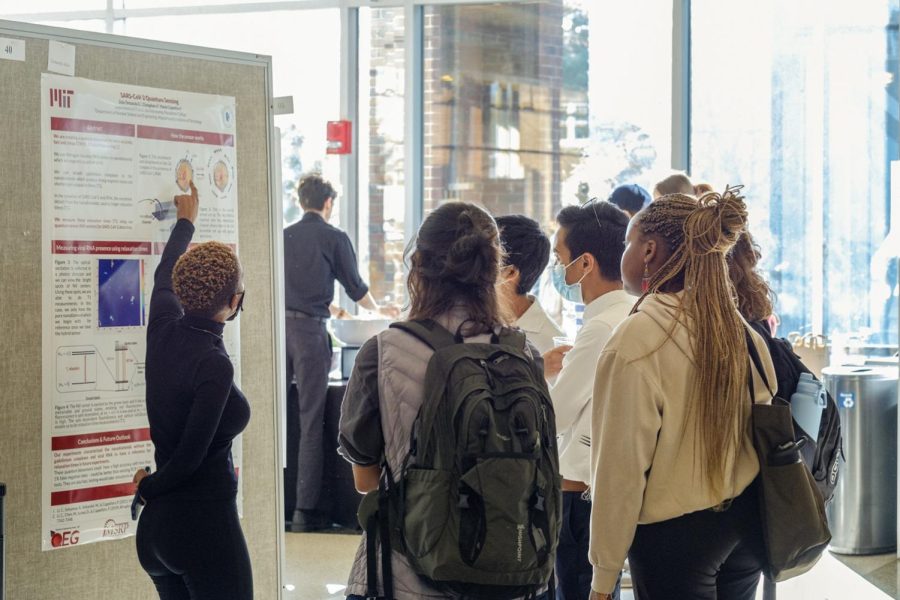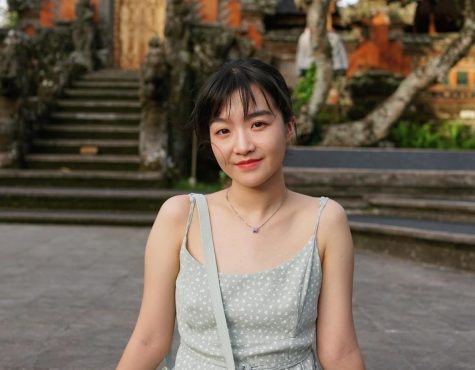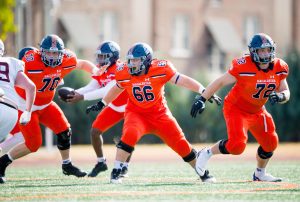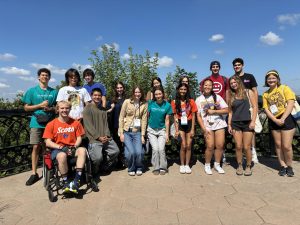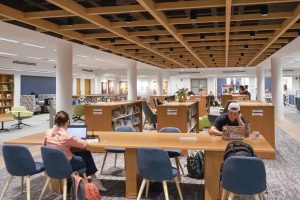Celebrating the possibility of experiential learning at Mac
October 13, 2022
On Sept. 30, the previously quiet Alexander G. Hill Ballroom at Kagin Commons came alive with dozens of bulletin boards neatly arranged in the hall. The first to enter the ballroom were students in ties and formal attire, each holding a roll of posters and putting them up on the boards. More than 70 students were in attendance to present their summer academic research and internship results.
The Summer Research Showcase has been an annual tradition at Macalester since the early 2000s. Although it started primarily in the natural sciences, it has now expanded. Students from all disciplines are invited to show their collaborative work with faculty and off-campus research teams.
A particularly large number of biology students presented in the showcase this year. Dalila Amaya ’23 has been fascinated with genetics since high school and finally got her hands on a dog genotyping project this summer with Biology Professor Mary Montgomery.
“It was a full circle moment for me, because I’m a senior,” she said. “This project is going to be used in the genetics lab this semester … and hopefully, it stays in the curriculum for a long time, because both me and Mary have worked very hard on it.”
On the other side of the ballroom, another biology student Eliza King ’23 presented her lion scat samples from Tsavo East National Park, Kenya, to her friends, who brought her a bouquet of pink Alstroemeria, which are Peruvian lilies. Her research shows that African lions prefer the endangered species Hirola at an extremely high rate. King also sees her projects having practical implications for endangered species preservation.
“I think that this can have helped educate conservation for Hirola … what their roles are in their ecosystems, and how we can use that to help conserve them, and their way of life,” she said.
While presenting their words and achievements, students tended to be self-reflective about the obstacles they encountered during their research.
Clarence Pan ’24 said he spent around 600 CPU hours (20 hours in real-time) running data for his computational quantum studies, so a lot of patience and caution are needed.
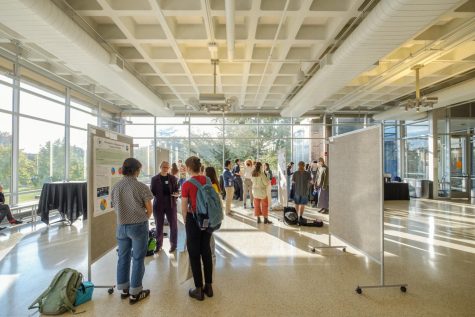
Daniel Whitman ’24, who studied the effects of invasive plant removal on Ordway’s peninsula, mentioned data collection limitations due to the pandemic and uneven experimental protocols.
“Just being honest about those limitations and explaining how that affects the graphs and the results that we have,” Whitman said.
Whitman hopes this project could be a longitudinal study that future students would carry on.
“I hope students in the future, who get the chance to work in the Ordway will be able to look back at the data that we’ve collected … as a reference point for when they’re looking at the forest,” he said.
Abby Marsh, assistant professor of mathematics, statistics, and computer science, came to the showcase to support her students.
“I think it’s nice that the students who do so much work over the summer have a chance to present their research and meet other students who are doing it,” they said. “I also think it’s a great opportunity for people who are considering doing summer work with a professor or have something in mind.”
Sarah Choi ’24, who attended the event to support her friends, expressed that she is impressed by how much her peers accomplished in the summer and how put together all the presentations looked. However, she expressed that it would be better to have a central area, such as a shared Google Drive, for the audience to be able to refer back to the research posters after the showcase and contact researchers for more information.
Although there isn’t a place for audiences to refer to the posters, there is a website that catalogs descriptions of students’ research. Some students present via digital posters in the showcase as well.
According to Brenda Piatz, the program assistant of academic programs and advising, this is the third year that the Summer Research Showcase has adopted a hybrid mode of presentation, due to the pandemic. It can also be a source of marketing purposes for the Admission Office.
“It’s a way to show people outside Macalester the different kinds of opportunities that are available for students,” Piatz said.
Vice Provost and Associate Dean of the Faculty Paul Overvoorde also agreed the hybrid presentation mode gives students who cannot present in person a chance to show their work online. As he patrolled the showcase, he was happy to see energy and excitement circling the room.
“(At) Macalester, we talk a lot about experiential learning or things that happen outside of the classroom,” he said. “The summer opportunities are one of the ways that end up happening. So, it’s fun to celebrate that possibility.”

